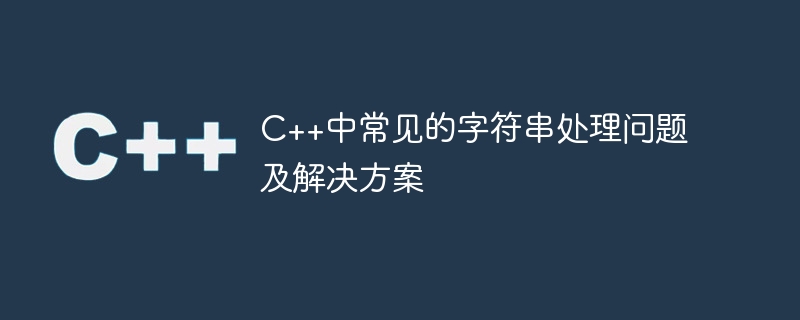C++中常見的字串處理問題及解決方案
- 王林原創
- 2023-10-08 23:10:59798瀏覽

C 中常見的字串處理問題及解決方案
引言
字串處理是C 程式設計中經常遇到的問題之一。無論是從使用者的輸入,還是從檔案中讀取數據,或是進行數據的處理和轉換,字串處理始終佔據著重要的位置。本文將介紹在C 中常見的字串處理問題,並給出相應的解決方案,並提供具體的程式碼範例。
問題一:字串長度
有時候,我們需要取得一個字串的長度,這是一個常見的字串處理問題。 C 中提供了兩種方式來取得字串的長度:使用C字串函式庫函數和使用C 標準函式庫的字串類別。
解決方案一:使用C字串函式庫函數
C字串函式庫函數提供了一個名為strlen的函數,用於取得字串的長度。下面是一個範例程式碼:
#include <iostream>
#include <cstring>
int main() {
const char* str = "Hello, world!";
int len = strlen(str);
std::cout << "The length of string is " << len << std::endl;
return 0;
}解決方案二:使用C 標準函式庫的字串類別
C 標準函式庫的字串類別提供了一個名為size的成員函數,用於取得字串的長度。下面是一個範例程式碼:
#include <iostream>
#include <string>
int main() {
std::string str = "Hello, world!";
int len = str.size();
std::cout << "The length of string is " << len << std::endl;
return 0;
}問題二:字串比較
在字串處理中,經常需要進行字串比較的操作。比較字串可以用來判斷兩個字串是否相等,以及確定一個字串在另一個字串中的位置等。
解決方案:使用C字串函式庫函數或C 標準函式庫的字串類別
- 使用C字串函式庫函數
C字串函式庫函數提供了一個名為strcmp的函數,用於比較兩個字串。下面是一個範例程式碼:
#include <iostream>
#include <cstring>
int main() {
const char* str1 = "Hello";
const char* str2 = "World";
int result = strcmp(str1, str2);
if (result == 0) {
std::cout << "The two strings are equal." << std::endl;
} else if (result < 0) {
std::cout << "The first string is less than the second string." << std::endl;
} else {
std::cout << "The first string is greater than the second string." << std::endl;
}
return 0;
}- 使用C 標準函式庫的字串類別
C 標準函式庫的字串類別提供了一個重載的"=="操作符,可以直接進行字串的比較。下面是一個範例程式碼:
#include <iostream>
#include <string>
int main() {
std::string str1 = "Hello";
std::string str2 = "World";
if (str1 == str2) {
std::cout << "The two strings are equal." << std::endl;
} else {
std::cout << "The two strings are not equal." << std::endl;
}
return 0;
}問題三:字串轉換為數字
有時候,我們需要將字串轉換為整數或浮點數。這是一個常見的字串處理問題,C 提供了對應的函數來實現字串到數字的轉換。
解決方案:使用C 標準函式庫的字串類別及相關函數
C 標準函式庫的字串類別提供了一個名為stoi的函數,用於將字串轉換為整數。下面是一個範例程式碼:
#include <iostream>
#include <string>
int main() {
std::string str = "12345";
int num = std::stoi(str);
std::cout << "The number is " << num << std::endl;
return 0;
}如果需要將字串轉換為浮點數,可以使用stof函數。以下是一個範例程式碼:
#include <iostream>
#include <string>
int main() {
std::string str = "3.14";
float num = std::stof(str);
std::cout << "The number is " << num << std::endl;
return 0;
}結論
字串處理是C 程式中常見的問題之一,本文介紹了在C 中常見的字串處理問題,並給出了相應的解決方案,並提供了具體的程式碼範例。希望這些範例能幫助讀者更好地理解和掌握C 中的字串處理技巧。當然,這只是一部分常見的問題和解決方案,實際應用中還會遇到更多的實際情況,需要根據具體的需求進行相應的處理。
以上是C++中常見的字串處理問題及解決方案的詳細內容。更多資訊請關注PHP中文網其他相關文章!

